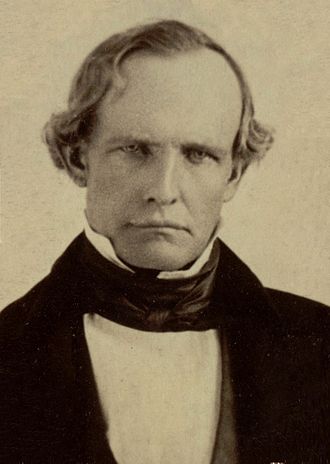Throughout 1848, fortune-seekers streamed into California, even though the U.S. government had not yet acknowledged the discovery of gold. By October 1848, there were 8,000 men mining for gold in California, doubled from the 4,000 in July of that year.
William T. Sherman made his second trip to the gold fields in the fall of 1848, and reached the Stanislaus River, called “Sonora” after the region of Mexico where many of the miners came from. Sherman reported that more and more mines were being discovered every day, both north and south of the Stanislaus.

Miners poured into California from Oregon. A few brought wagons down the east side of the Sierra Nevada and reached Sacramento in late October 1848. One of these Oregonian miners was Peter Burnett, who later became California’s first governor.
Burnett described the difficulties of the trail to California along the Yuba in his Recollections and Opinions of an Old Pioneer. He wrote:
I could hear the wagons coming down that rough, rocky hill until midnight. Some of the people . . . had been without water for nearly two days.”
. . .
“Below, glowing in the hot sunshine and in the narrow valley of this lovely and rapid stream, we saw the canvas tents and the cloth shanties of the miners.
Meanwhile, not only was official acceptance of the gold rush slow to come from Washington, but news from the East Coast also arrived slowly in California. On October 23, 1848, the San Francisco newspaper, The Californian, reported news just received from the east via Monterey:
We have been politely favored with the perusal of a letter from Monterey to a gentleman of this town, from which we gather some highly interesting and important intelligence. Two vessels had arrived at Monterey, by which intelligence had been received from Boston and Washington up to June 29.
. . .
“Martin Van Buren was a self nominated candidate for the Presidency, taking the anti-slavery side of the question. Hale of New Hampshire, was the abolition candidate.
“The election for Presidential electors is to be held on the same day in November throughout the Union.
This last point was significant, because 1848 was the first year in which the presidential election took place on the same date throughout the U.S.—November 7, 1848.
In the 1848 presidential election, the candidates were Martin Van Buren, a former Democrat (and former President) who headed the Free Soil Party, Lewis Cass of the Democratic Party, and Zachary Taylor of the Whig Party. Taylor won, but died in 1850, just sixteen months after taking office.
Of course, residents of California could not vote in the 1848 election, because California was not a state. This newspaper account came just a week before the election took place. It had taken four months—from late June until late October—to reach California. How could California ever become a part of the nation when communications were so slow?
And yet, less than two years later, on September 9, 1850, Congress approved California’s statehood.
When have poor communications caused difficulties for you?




Very interesting history, Theresa. Thanks for sharing.
Most of the difficulties I’ve experienced as a result of poor communications are in the workplace.
Jill,
Mine, too. We spend most of our time with families and in the workplace, so that’s where our communications problems take place!
Thanks for reading,
Theresa
In my experience, poor communications result from misinterpreting what has been said or written. Everything we hear, and everything we read, passes through filters that have been constructed as a result of our life experiences. Oftentimes, those filters don’t do us justice.
The stories we tell ourselves — those filters — are often wrong, but they have a much greater impact on what we hear than the words people actually use when communicating with us.
Thanks for reading,
Theresa
Interesting. It took another twenty years for the Pony Express to change that two months to 10 days.
Exactly. And the telegraph and railroads reduced the time further in the 1860s.
It amazes me that we now have instantaneous communication with most of the world. Thinking of waiting for months for a reply is almost impossible for us to fathom.
Thanks for the comment,
Theresa